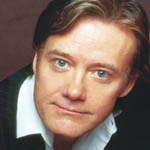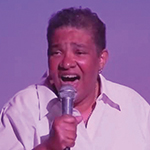Kim David Smith
Stargazing
October 8 at 8:00 pm
Joe’s Pub
425 Lafayette Street, NYC
212.967.7555
 Here’s what our Barbara Leavy had to say about one of Kim’s earlier shows, Misfit:
Here’s what our Barbara Leavy had to say about one of Kim’s earlier shows, Misfit:
Perhaps it is time for another Cabaret Scenes writer to review Kim Smith. I have run out of adjectives, such as “mesmerizing” or “compelling” or “brilliant.” So I will here borrow one from Steve Ross, who supplied me with it at the end of Kim’s most recent show, Misfit. Steve called him “audacious.”
And of course he is. He admits to flirting openly with his audience as he invites them to understand that he is an “alien,” a “misfit,” taunting them seductively to deny his appeal to parts of themselves they usually try to repress. He is also an alien in another sense, an Australian proud of the cut-throat background of a country settled by criminals who were sent there instead of jail, and quite capable of taunting Americans with the cauldron of emotions (he describes it lasciviously as a delicious soup he loves to drink) that lies beneath its Puritan heritage. But why try to describe Kim Smith and his show? It has to be experienced. It is perhaps enough to say that if it ran for two hours instead of one, it still wouldn’t be enough.
It is not until close to the end of the show that Kim sang Friedrich Hollaender’s “Illusions,” but when he did, it defined a theme that actually ran throughout the evening: illusions and their counterpart, harsh reality. In “Bang, Bang” a childish game becomes a devastating adult experience. “My Ship” (with its sails of silk) is paired with “Surabaya Johnny” to contrast a dream with betrayal and a hatred that cannot obliterate love. “Black Market” reveals how the allure of available goods to be bought obscures the price that has to be paid for them.
And perhaps the strongest contrast of all involves a medley of three songs: “Dixie”; “Strange Fruit”; and “Summertime.” The first is a Peter Allen song, and it describes a lie that Australians might succumb to, an image of the south as a place redolent with magnolias where slaves sang rather than labored. The lie is exposed in the haunting second song, for the strange fruit of the south are the bodies of lynched black men hanging from the limbs of trees. And the concluding song is extremely ambiguous. It is the beautiful classic from the beautiful Porgy and Bess, a show that has given rise to an ongoing debate about whether the opera is an American classic or, again, a fraud, definitely politically incorrect.
It would be possible to pause over each of the evening’s songs. One that has to be spoken of is “Pirate Jenny,” the Weill/Brecht classic that appears on the song list of almost every performer who features the Weimar period of music and lyrics. Pairing it briefly with “What Shall We Do with the Drunken Sailor,” Kim delivers what may be its most powerful rendition. The two songs wrap up the theme I have tried to describe. Out there is the dark sea, beckoning dreamers to its depths, home to sailors who travel the world and escape from the tedium of everyday life, as Jenny dreams she will. But it is that same sea that is quite ready to fling the dreamer mercilessly back on the shore.





